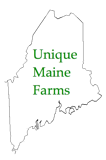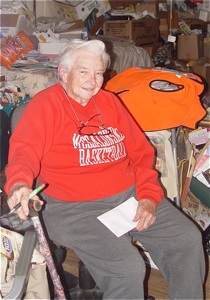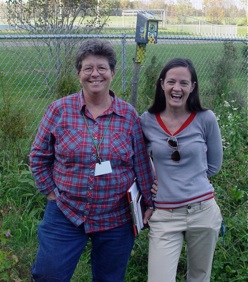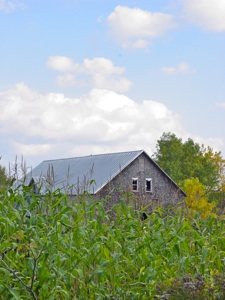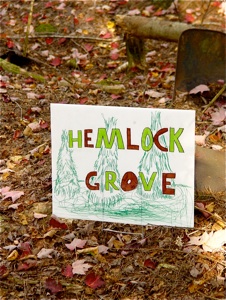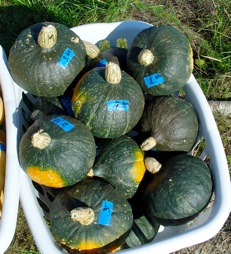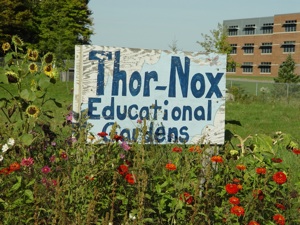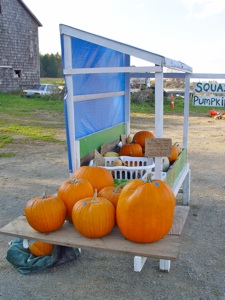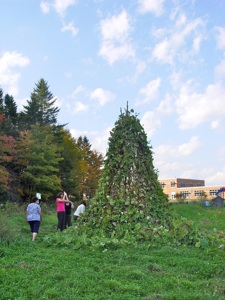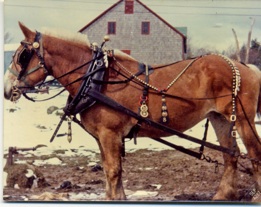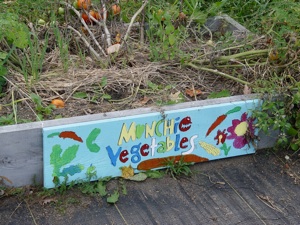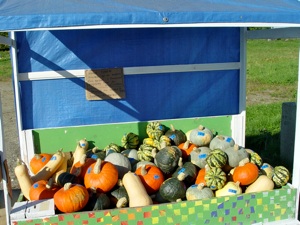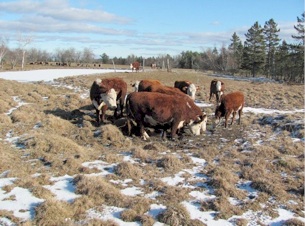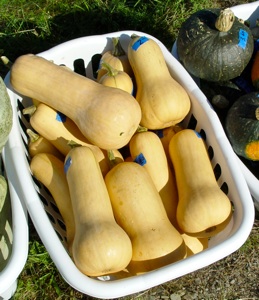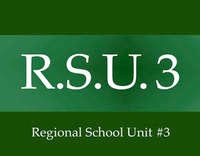Name: Thor-Nox Farms
Address: Thor-Nox Farms
Agricultural Education Center
232 Knox Ridge Road North
Knox, Maine 04986
Phone: 207-568-3468
207-568-3366
Website: www.thor-knoxfarms.org
Facebook: Thor-Nox Facebook Page
Email: info@thor-noxfarms.org
Products and Services:
-educational gardens
-educational programs and research
-farm stand
-Kids Can Grow program
-corn maze
-trails maintained by Nature for LIFE
-natural pasture-fed beef
-forest products
What Makes Thor-Nox Farms Unique?
The amount of preparation and collaboration that went into the planning the transformation of the 400-acre Bessey Farm on the Thorndike/Knox border into three separate entities must have been mind-boggling. In 2004, after a year of research and negotiations, the Besseys donated a conservation easement to Maine Farmland Trust that was designed to protect the farm from development. In addition to forming the trust, the non-profit Thor-Nox Farms Agricultural Education Center was established. The third component that was formed as part of the transformation of the farm operation is the for-profit Bessey-Thor-Nox Farm Corporation which oversees the beef and lumber enterprises.
Dr. Shirley Bessey is the only surviving heir of the Bessey family. After earning her Doctorate in Leadership Development, she spent many years teaching in Kansas, and at the University of Wisconsin, SUNY, and Boston University. She and her brother, Roy, were determined to see that their family’s land remain in agricultural production. The farm had been in their family since 1895. Both Roy and Shirley grew up on the farm and they were the third generation to work the land and raise animals. The twenty-three Holsteins that they raised when they were young were milked by hand. After selling their dairy cows in the 1950’s, the Bessey family raised beans for the Hart Seed Company.
Shirley shared information about how Roy raised Herefords in the 1970‘s, eventually building up the herd to over a hundred cattle. The meat from the cattle was marketed in Portland and southern Maine. When Roy passed away in 2008, Shirley took over ownership of the farm. The meat from the cattle that are presently raised on the farm is sold to friends and neighbors and also to the Mt. View school district.
The non-profit Thor-Nox Farms Agricultural Education Center is run by a board of directors who serve as planners and overseers. An advisory group has been vital to the success of the farm operation. It has included representatives from the Maine Department of Agriculture, the University of Maine Cooperative Extension, the United States Department of Agriculture, the Knox Historical Society, Unity College, MOFGA, RSU 3, and local farmers, teachers, and leaders.
The Mount View School, which is situated adjacent to the farm, accommodates students from eleven different towns from kindergarten through high school. RSU3 has embraced the Thor-Nox Farms as their neighbor. Some of the vegetables that are grown in the community garden at the Thor-Nox Agricultural Education Center are purchased for use in the school cafeteria. This past summer a teepee structure was erected in the garden that was covered with pole beans. Birdhouse gourds that were grown hung from the inner area of the teepee. A large corn maze was also established at the farm and the schoolchildren and community were welcome to explore it.Situated next to Route 220 near the community gardens was a farm stand. A high tunnel will be erected to extend the growing season in the near future.
Heather Perry, the Superintendent of RSU 3, explained how the students in grade K-12 have worked with Thor-Nox Farms in various ways. She shared that their High School alternative education program worked with Elementary Student partners and Thor-Nox representatives to plant and tend a garden and then to harvest the garden in the fall. She also recounted how the Middle School and High School physical education teachers use the trails year round for walking and snowshoeing and GPS orienteering, as well as geocaching. Middle School students helped to design, plant, and create a corn maze.
Middle School and High School science students learned about forestry, vernal pools, and herbology.
Superintendent Perry commented, “Having a resource such as Thor-Nox Farms located directly next door to our schools allows us to open the doors of our schools and the minds of our children to new hands on learning experiences that they otherwise might not have access to. Last year I was observing a middle school science classroom in May. A 7th grade student was working on a slide presentation and came across the term “vernal pool” and asked the teacher - “What is that?” The teacher said, “Well, it’s easier to show you than explain it.” “ Want to see one?” The entire class went outside, walked next door and observed a vernal pool! They were so curious they wanted to learn more, so the next week was spent exploring!That’s the power of our Thor-Nox Collaborations - outdoor learning experiences aligned to our curriculum RIGHT NEXT DOOR!:)”
Various classes from the Mount View Elementary School help with the gardens. Some of the classes use the garden area and the trails in the woods for nature study. Signs made by the students point out various habitats. On one of the days that Unique Maine Farms was visiting the farm, Melissa Bastien was leading elementary school teachers on a tour of the trail in the woods and the gardens and corn maze.
The schools in RSU 3 are not the only ones who value the farm as a location for farming and learning. Unity College has conducted studies on the land with various forestry classes. A study of the hemlock wooly adelgid is presently taking place.
The for-profit Thor-Nox Farms Corporation currently is working on three avenues of acquiring revenue: the beef enterprise, the management of the woodlot, and the leasing of farmland. The Thor-Nox Farms is approximately 400 acres with about 100 acres cleared for hay and pasture and between 55 to 60 acres delegated to the beef operation. There are plans to tap the sugar bush using old-fashioned methods for the production of maple syrup in the future.
The Hereford herd at Thor-Nox Farms is presently around forty-two head of cattle and it is managed by Steven Fowler. Dr. Bessey shared her excitement with the recent purchase of a bull named “Apollo” that has the paperwork to be registered. His purchase was especially meaningful in that Apollo was a descendant of Roy’s Bessey’s original herd and Dr. Bessey thought he looked a great deal like one of Roy’s bulls that he had named “Big Boy.”
Some of the meat from the cattle raised on the farm is sold to the central school complex in Thorndike as well as to the four satellite schools. A forestry management plan for the property has been conducted by Paul Miller, a licensed forester, and wood is being harvested by Clayton “Rob” Larrabee, Jr. for pulp wood and for lumber products.
A few years ago, the University of Maine Cooperative Extension sponsored a Kids Can Grow program at the Thor-Knox Agriculture Education Center. Nature for LIFE, an enrichment program which is held after school, was begun at the Mt. View Complex. It welcomes students in grades k-8. Melissa Bastien is the present agricultural educator at the center and she has worked with children to help in the planting of vegetable gardens.
In addition to the land that has been saved for agricultural use, a great deal of history is being preserved at the farm. Dr. Bessey resides in the 1817 farmhouse, which is believed to be one of the oldest homes in the town. The one-room schoolhouse from East Knox was moved to the farm property in August of 2013, and it will eventually be used as a museum.
It is fortunate that Dr. Bessey spent the time to record her memories of growing up on the farm.
She shared information about how the Hurd Farm (now the Kinney Farm) and the Vose-Bessey Farm was owned by the Tozier family in the late 1890’s. When an epidemic hit the area and the Toziers lost two of their children to illness, the Tozier parents moved away and split their property into the two farms. When Shirley was growing up there were dairy farms and fields that supported eleven families. There was a period of time when farmers in the area were growing crops such as beans, corn, and peas for the canning companies in Freedom, Unity, and Liberty. Dr. Bessey is saddened by the fact that only two working farms remain on the Ridge today.
There is no question about the value that Shirley and her late brother, Roy, placed on the benefits of keeping land in agricultural use. Their vision of creating an Agricultural Education Center has been embraced by so many individuals. This profile will conclude with the Principles and Guiding Thoughts that Shirley shared with the Governance Committee because the message of these Principles and Thoughts are very significant in an understanding of the Thor-Nox Farms’ project which incorporates three separate entities that work together to ensure the future of farming in the Thorndike/Knox area.
Treat all living beings, including forests, pastures and water with respect. Create a Productive farm with a strong educational component. Create the Center to advance agriculture. Aim for whole farm productivity.
I see this Ag-Ed farm as a cross of playground, school, lab, and workplace. Participants may be mixed or like groups, individuals, families, or clubs. All areas of the farm can be used for production, education, and recreation, with continuing growth in all these areas.
Forms of growth will be as varied as are the participants. In learning and growth, it is difficult to tell which gains more, the one who has just transplanted his first tomato or the one who guided him through the process. Getting help and giving it can both be growing experiences and we seek both in our programs.
Along with the foregoing will be the production of food to be used within the community or sold to help support the program. Forest products and programs would be included, such as trails used for exercise, education, orienteering or recreation, and an area much more difficult to describe - the growth of learning and desire to build better farms, communities, and people.


